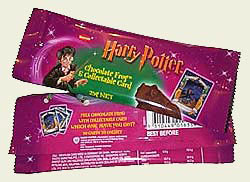Harry Potter and the Curse of the Non-Fair Trade Chocolate
Posted on July 27, 2011 at 8:18 am
The last of the Harry Potter films is out and Fandango reported over 5000 shows were sold out before opening day. It’s a likely candidate for this year’s box office champion with multi-million dollar revenues from tickets and perhaps even more from the lucrative licensing and product sales, estimated at over $14 billion by Brand Licensing Europe. But a recent campaign endorsed by four members of the Potter cast demonstrates that these partnerships can bring risks as well as rewards.
An advocacy group self-dubbed the Harry Potter Alliance has written a letter to the studio behind the Potter films, NBC Universal and Time-Warner asking them to make sure that the chocolate sold in the Harry Potter wrappers meets Time-Warners’ own ethical sourcing guidelines, with copies to Potter author J.K. Rowling, the corporations behind the theme park, and more.
The Harry Potter Alliance has also asked its members, over 100,000 in 70 chapters around the world, to support this initiative by uploading a video on the subject to CNN’s anti-slavery Freedom Project and by purchasing fair trade chocolate and sending the wrappers to Time-Warner.
Evanna Lynch, who plays Harry’s classmate Luna Lovegood, has signed the Alliance’s petition and made a statement in support of the campaign. Three other actors from the cast signed on this week.
Warner Brothers has agreed to work with the Alliance and assured them that their ethical sourcing guidelines are included as a part of every licensing agreement. In the US, most of the Harry Potter chocolate is sold in the theme park through a re-license arrangement, and their candy is a tiny fraction of the non-fair trade chocolate sold each year, so their involvement is limited. But their profile is high and their interest in the brand is strong, which makes them a good target for this campaign.
Harry Potter Alliance director Andrew Slack told me that Warners is “a cut above” the other companies. He is optimistic about making progress and Warner Consumer Products confirmed to me that they are working toward a solution. In the meantime, there are a few lessons to be learned about licensing risk.
1. Using an established name or brand to sell your product can leave you open for a judo-like upset, using your own strength against you. The chocolate companies and theme park paid for a license because they thought the Potter name would help sell chocolate. The boost the candy got from the name may be overtaken by the reputational hit the name gets from selling the candy. My favorite brand expert is Jonathan Baskin (he’s also my cousin), who says, “This illustrates the complexity of translating an imaginary idea into a concrete product or service. I can’t imagine that the short-term upside outweighs the risks.”
2. “Guidelines” are easy to agree to and difficult to enforce. Time-Warner may have an excellent ethical sourcing policy for its own products, but insisting on non-enforceable guidelines for licensees without any effort to check independent third-party assessments leaves them vulnerable to this kind of bad publicity.
3. The group that is making the most effective use of the Potter name is the one that did not enter into a license or pay a fee — the Harry Potter Alliance. It has no official connection to the J.K. Rowling trademarked properties but it has been named a “fan site of the month” by her website and she has spoken approvingly of its activities. Just as the wizards in the Potter books can’t match the healing properties of the muggle chocolates, businesses who think they understand the best use of brands have a lot to learn from the amateurs on this one.

